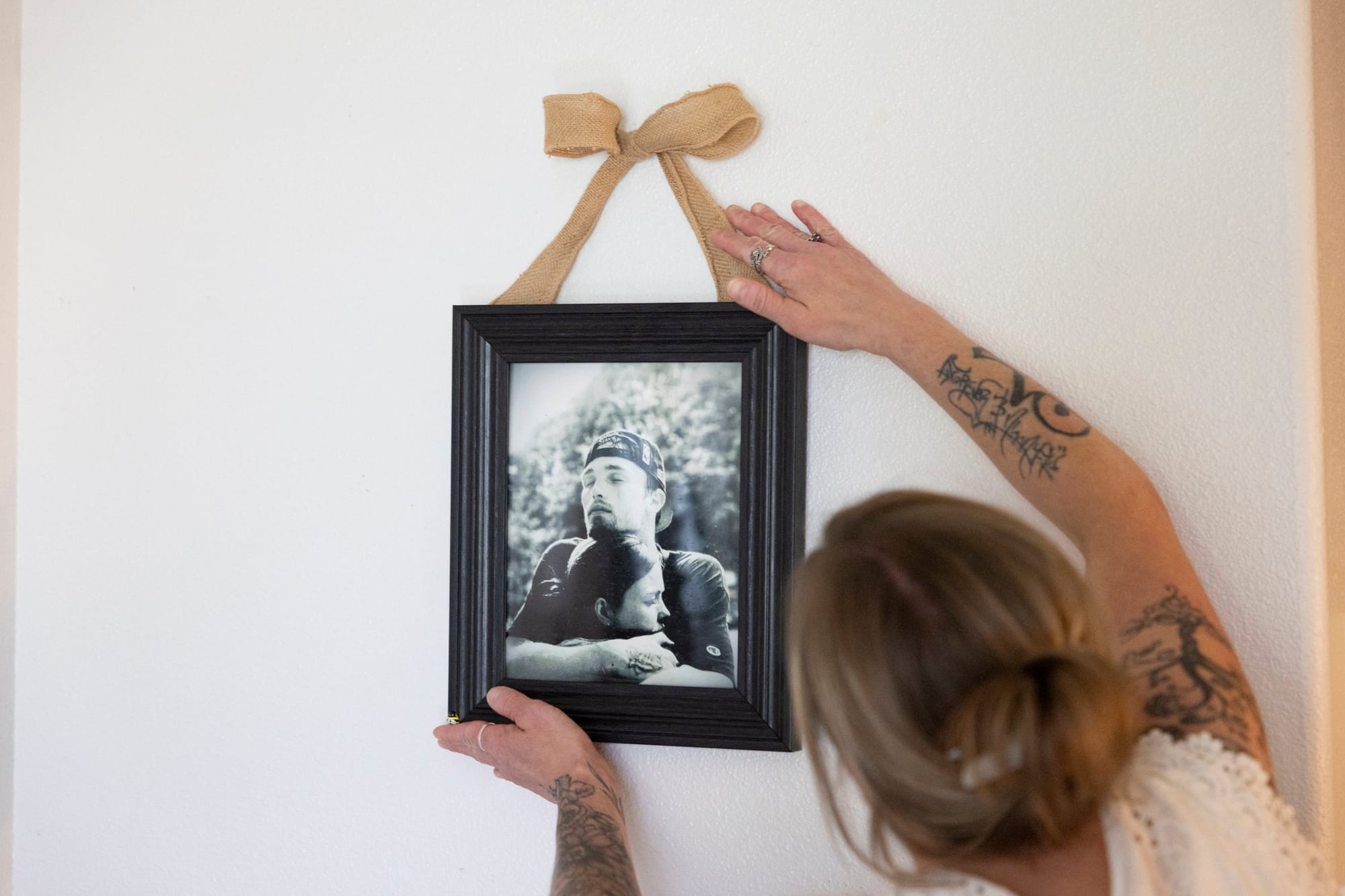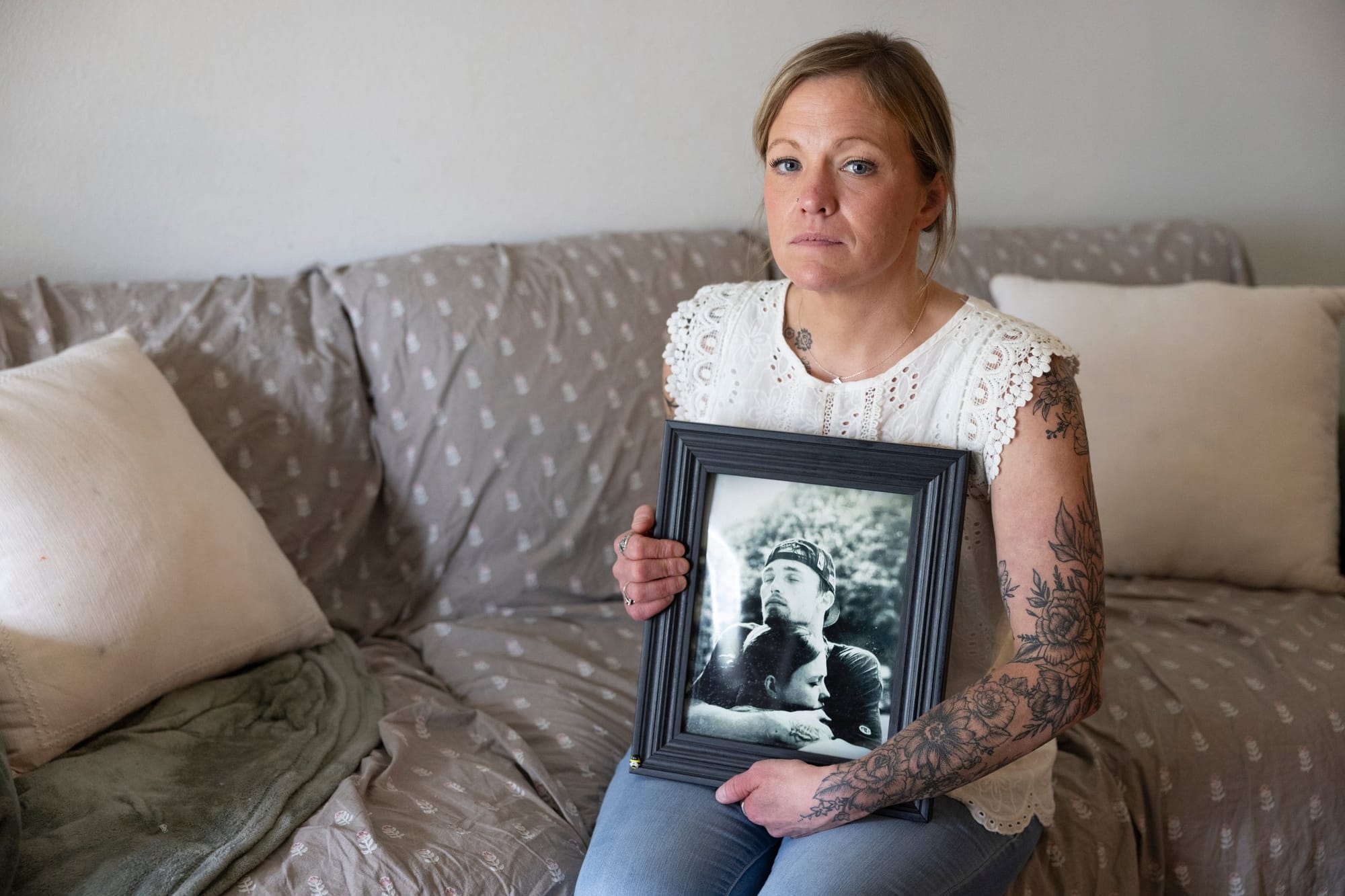Complaint against WA Rep. Tarra Simmons alleges misuse of $30,000 in campaign funds
It’s the third ethics complaint filed against her in recent months
“They knew he was dying,” says his wife, who wasn’t told until it was too late

Katie Kuhnhausen scrolled frantically. Seated in a parked car while her son’s soccer team practiced under the receding spring sun, she scoured the Washington Department of Corrections website for contact information.
She had tried to visit her husband the day before at the Washington State Penitentiary in Walla Walla, where he had nearly completed his 17-month sentence for a felony gun possession charge and a traffic misdemeanor. But prison staff turned her away.
And she called. And called. But no one at the prison would give her a straight answer.
From her car, she fired off an email to the prison’s superintendent with the subject line: “HELP ME!!! HELP ME!!!”
“I have called the Penitentiary over the last week 16 times trying to get help and/or answers about my husband,” she typed that evening, April 22, 2024. “I still haven’t heard from my husband or a staff member letting me know about my husband’s condition.”
None of the Department of Corrections officials replied to her email that night. Only months later, after requesting her husband’s medical records, did she learn that he was no longer at the penitentiary as she frantically called for information. A medical crew was airlifting him to Providence Sacred Heart Medical Center in Spokane.
Prison officials did not explain why he had been out of touch: He had been in solitary confinement, where a bacterial infection ravaged his kidney and was now spreading to the 25-year-old’s lungs and brain.
And they did not tell her that multiple doctors agreed he was too sick to survive surgery to replace his damaged heart valves.
“They knew he was dying,” Katie told InvestigateWest. “There’s so many things that I should have said or should have talked about with him, and I just didn’t get that time.”
The escalating series of failures and ignored warning signs documented in Alex’s medical records offer a rare look at how decisions made by prison officials can turn treatable ailments deadly and how recent legislative efforts to boost transparency in the state’s prison system still fall short.
Corrections officials declined to speak about Kuhnhausen’s death for this article, but they sent an emailed statement saying the department has “made significant strides in recent years” and focused more on preventative care.
Official statistics show 39 people died in Washington prisons last year, a number that rose during the pandemic and remains elevated. An annual review of Department of Corrections death reports by an independent watchdog agency found that at least three other prisoners died of infections during fiscal year 2024, one of whom was 45 years old.
The details of prisoner deaths remain murky, even to lawmakers. Since 2021, the Department of Corrections is required to publish reports each time a prisoner dies “unexpectedly,” but details are limited and key information is often omitted. Medical records show Alex’s body was never autopsied, a missed chance to perhaps better understand what led to his death.
The full stories often emerge only after grieving family members like Katie Kuhnhausen demand records and answers from the state about what happened to their loved ones. Though the prison won’t discuss specifics of Alex’s death publicly, records show that privately, Department of Corrections officials questioned their own role in Alex’s death — like whether placing him in solitary confinement as his condition worsened hastened his demise.
“What I heard was really hard to hear, but it was the truth,” she said. “Everybody deserves the truth of what happened to their loved one.”
Katie’s worries began two weeks earlier, when her regular calls with Alex abruptly ended as prison staff moved Alex into solitary confinement. They had caught Alex with a homemade syringe, and he admitted to shooting suboxone, a medication used to treat opioid addiction, intravenously.
Prison officials stripped him of the “good conduct time” that would have secured his release just two days later, according to internal reports. Instead, a hearing officer sentenced Alex to “30 days confinement to cell,” and he was transferred that same day to solitary confinement, a fateful decision that department officials would later privately concede may have played a part in his death.
The decision also appears to contradict official policy: The department claimed in 2021 that it stopped using solitary confinement as a punishment. A spokesperson wrote that the agency uses “administrative segregation” to remove prisoners temporarily “pending investigation for behaviors that represent a significant threat.”
Alex had already alerted prison staff that he was coughing up and sneezing blood when they put him in the hole. But clinical staff, often preoccupied with his drug use, repeatedly failed to catch the bacterial infection that would ultimately kill him.

One physician’s assistant guessed the problem was thrush, a fungal infection, and prescribed an antifungal mouthwash. When the mouthwash made him throw up all night and sleep all day, another physician’s assistant diagnosed him with opioid withdrawal, noting his speech was dull.
“The medical staff guessed him right into the grave,” Katie said. “They essentially told him he was a junkie.”
When Katie arrived for her scheduled April 21 visit, staff told her Alex was not physically capable of attending. A nurse dispatched to Alex’s cell found him too weak to get up or hold a cup to his lips. Alex told the nurse that he had not eaten or drunk for two days. The nurse diagnosed Alex as dehydrated and directed him to “diet as tolerated” and “continue current medications.”
Prison officials sent Katie home. Five hours later, a new nurse came on shift and called an ambulance. But it was already too late. The emergency room doctor at St. Mary Medical Center in Walla Walla diagnosed Alex with sepsis and kidney failure, warning there was a “high probability” that he would die.
Alex’s health rapidly declined over the next 24 hours leading to his airlift. But Corrections officials still did not tell Katie that he had been hospitalized. Finally, the morning after his flight to Spokane, they called her. She drove to Spokane and visited him in the hospital that evening, but a guard told her she was not allowed to sleep in the room with Alex, so she returned to her hotel.
In the early morning hours of April 24, doctors in Spokane intubated Alex after he struggled to breathe. An anesthesiologist on duty tried to call Katie, but the guard minding Alex stopped him.
“I made all attempts to contact family but was actively prohibited from calling them directly by guard accompanying [patient] in room,” the anesthesiologist wrote in a medical note submitted that morning.
“I threatened to just call wife directly but was told in strong terms not to as this was not ‘protocol.’”
Asked what protocol the guard was referring to, a Department of Corrections spokesperson wrote that “incarcerated individuals are not allowed to make calls from their hospital rooms,” but did not explain why the guard prevented the doctor from calling.
Department of Corrections officials informed Katie about her husband’s impending death at 6:20 am, according to an internal incident summary. Alex was pronounced dead less than one hour later.
“I kind of feel like I was cheated out of this time with my husband before he died,” Katie said.
“He was dead when I got there.”
Alex Kuhnhausen’s death illustrates shortcomings in recent legislative efforts to increase transparency in the state’s prison system.
Lawmakers in 2021 began requiring the Department of Corrections to publish written reports when inmates die “unexpectedly,” a broad category that excludes terminal illness and “debilitating or deteriorating” conditions likely to lead to death. But those investigations are conducted largely by Corrections staff, and the resulting public reports can obscure internal choices that may contribute to inmate deaths.
The official report on Alex’s death offers an abridged timeline of his death that does not include the word “infection.” His interactions with nurses and guards are noted in terse entries (“nursing wellness check completed”) that offer little clue as to what those nurses did.
One day’s entry reads simply: “He was evaluated and treated in clinic by a provider.”
The report expressed gentle concern that medical staff “did not utilize appropriate diagnostic curiosity” and “focused on treating withdrawal symptoms and failed to consider a possible infection.” The review committee recommended updates to protocol and staff education.
Internal documents offer more candid assessments of what went wrong. In a mortality review logged three months after Alex’s death, the department’s chief medical information officer, Dr. Frank Longano, raised the question of whether keeping Alex in solitary confinement contributed to his death. Under the heading “Issues for discussion,” he wrote, “did patient’s presence in segregation unit contribute to poor outcome?”
A department spokesperson declined to answer that question when posed over email, citing medical privacy laws.
In 2016, attorney Nathan Roberts won a $6.5 million settlement after suing the Department of Corrections on behalf of the family of a diabetic man who died while being restrained by guards at the Airway Heights prison in Spokane County. Roberts said he does not waste a lot of time reading the official Department of Corrections reports, which he compared to letting police investigate their own shootings.
“The only person with the full knowledge of what happened is dead,” Roberts said. “So you’re going to get a really one-sided picture of what happened.”
InvestigateWest provided Roberts with an overview of Alex’s medical records. He said they illustrate why lawmakers should require an objective review of in-custody deaths performed by outside physicians.
“Any physician who reviewed this one would conclude that this man should have seen a doctor much sooner,” Roberts wrote in an email. “This is a sad case of DOC converting a relatively short prison sentence to a death sentence, through denial of competent healthcare.”
Another missing piece of the puzzle: Alex’s body was never autopsied. Department of Corrections policy requires prison superintendents to request an autopsy, but the choice is left to county coroners and medical examiners, who may decline to do so.
Washington has an independent agency to watchdog the treatment of prisoners. But the Office of Corrections Ombuds has itself been criticized by families and advocates for censoring its own investigations in favor of forging quiet compromises with the department. Cascade PBS reported in 2022 that the Ombuds shelved three completed reports, including one on medical accommodations.
The Ombuds has raised its own concerns about death review teams lacking access to critical information. According to its most recent annual report, the office has often had to push for additional records beyond what the Department of Corrections provides to the death review teams and “conduct a separate records review and analysis.”

Reached by email, Ombuds Acting Director Elisabeth Kingsbury said the department has since addressed her concern about access to information by updating its critical incident review policy.
Still, the lack of information about prisoner deaths makes it difficult to hold Department of Corrections officials accountable when the department fails to medically treat inmates.
“I think there needs to be … some deeper dives into what is happening with medical treatment,” said Rep. Strom Peterson, a Snohomish County Democrat who sponsored a bill last year seeking to limit the department’s use of solitary confinement. “What is happening with diagnoses that in this case are just getting it so so wrong?”
Peterson, who reviewed a selection of Alex’s medical records, said his death could have been avoided and called the choice not to inform his wife until the last possible moment “inhumane.”
“Had they listened to her,” he said, “I think steps along the way could have probably saved his life.”
On a recent summer afternoon in her Vancouver, Washington, apartment, Katie Kuhnhausen opened her freezer door and grabbed a bag of chicken nuggets. Her son Max careened in through the front door wielding a water gun, refilled it in the sink and rushed back out. Katie closed the freezer door. A photo of her and Alex posing in front of jack o’ lanterns stared back at her.
“When Alex first died, I couldn’t look at his pictures,” she said. “I had to, like, buy new clothes because I could not open our closet doors, I couldn’t see his stuff.”
When she remembers their time together, it’s the simple things that stick with her. His knack for perfectly reciting the lyrics to any song that came on in the car. The precision with which he packed grocery bags.

The two knew each other growing up in Vancouver, but reconnected as adults when he stayed at the homeless shelter where she used to work. He lived a hard life, she said, and she valued his willingness to show his softer side. He was funny, enjoyed graffiti art and had a huge smile.
“Initially I would drive in my car and just scream,” said Katie, 45. “Within a few days or a week of when Alex died, I started researching. I knew in my heart that what happened wasn’t right, and I was going to figure it out.”
She filed records requests with the Department of Corrections. Phone records. Doctor’s notes. Emails. The documents she found told a far different story than the official reports.
Max returned, door flinging. The sounds of furniture screeching and video games escaped through the bedroom door. Katie dropped the nuggets in an air fryer and gave it a shake. On her right arm, she has a tattoo adapted from one of Alex’s drawings inscribed with his ashes.
Like many activists born of personal misfortune, Katie has no rigid policy program. She does not talk about abolishing prisons or curbing sentences. Before Alex died, she told him she thought prison had “saved his life” by forcing him to stop using drugs.
What outrages Katie is the disregard for her husband’s health and for her right to know about it. The department’s choice to keep her in the dark about her husband’s deterioration until the last possible moment indicates, to her, a culture of indifference to suffering.
“I’m not saying that they don’t deserve to be there or that they’re angels,” she said. “But they have families that are waiting for them.”
The least the department could have done, she feels, was perform an autopsy on Alex’s body. Whether it would have revealed anything or not, it would have been meaningful to her.
“It would have meant that somebody heard me,” she said.
Grief counseling has helped Katie view things differently. Her life remains marked by Alex’s loss, but through her activism she has gained a purpose that helps steel her against despair. She hopes to pass a law to increase oversight of the Department of Corrections. She wants to call it Alex’s Law.
“Someone said to me, ‘You guys get to do it together,’” she said. “‘It’s your last thing that you guys get to do together.’”
The story you just read is only possible because readers like you support our mission to uncover truths that matter. If you value this reporting, help us continue producing high-impact investigations that drive real-world change. Your donation today ensures we can keep asking tough questions and bringing critical issues to light. Join us — because fearless, independent journalism depends on you!
— Jacob H. Fries, executive director
DonateCancel anytime.
Subscribe to our weekly newsletters and never miss an investigation.